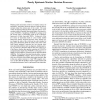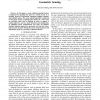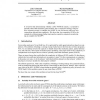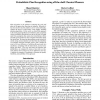350 search results - page 16 / 70 » Complexity of Planning with Partial Observability |
AAAI
2007
13 years 11 months ago
2007
Planning under uncertainty involves two distinct sources of uncertainty: uncertainty about the effects of actions and uncertainty about the current state of the world. The most wi...
CDC
2009
IEEE
14 years 1 months ago
2009
IEEE
In this paper, a novel artificial potential function is proposed for planning the path of a robotic sensor in a partially observed environment containing multiple obstacles and mul...
FLAIRS
2001
13 years 10 months ago
2001
Partially Observable Markov Decision Process models (POMDPs) have been applied to low-level robot control. We show how to use POMDPs differently, namely for sensorplanning in the ...
NIPS
2007
13 years 10 months ago
2007
It is known that determinining whether a DEC-POMDP, namely, a cooperative partially observable stochastic game (POSG), has a cooperative strategy with positive expected reward is ...
AAAI
2010
13 years 10 months ago
2010
Plan recognition is the problem of inferring the goals and plans of an agent after observing its behavior. Recently, it has been shown that this problem can be solved efficiently,...




